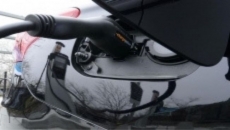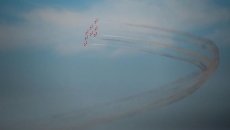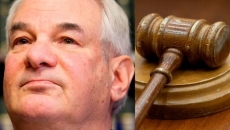OTTAWA - Finance Minister Chrystia Freeland has lots of reasons to be losing sleep.
Soaring living costs have Canadians lined up at food banks. The federal Liberals are anticipating a possible recession. And Freeland is personally connected with people living all across war-torn Ukraine.
But in April, the finance minister said there was another looming problem on her mind.
"If you were to ask what keeps me up at night, I'd say, 'China's zero-COVID approach and the very severe lockouts we're seeing right now,'" Freeland said at an event held by the Canadian Chamber of Commerce.
If Beijing's tough COVID-19 rules and factory shutdowns had her the most concerned, it was because these, more than anything else, were sure to wreak havoc on the supply chains Canada relies on to keep its economy running.
In July, Canada dodged what was potentially an even bigger blow when the U.S. broadened a policy that would have significantly advantaged the sale of American-made electric vehicles to instead include its NAFTA partners.
Yet the other problems remain.
Eight months after Freeland's comments, China is only now starting to loosen its policy of harsh lockdowns amid citizen uproar, and Russia's invasion of Ukraine has kept raising the cost of global commodity prices.
Now, Prime Minister Justin Trudeau's government is attempting to strike a tricky balance in managing Canada's supply chains, trying to shore up trade with like-minded countries while still taking advantage of China's unabated growth.
"To put it mildly, there's a bit of daylight between the two perspectives," said Michael Manulak, a Carleton University professor with the Norman Paterson School of International Affairs.
Supply chains have gone haywire ever since the World Health Organization declared COVID-19 to be a pandemic in March 2020. Shipping containers were diverted to medical supplies or held unused in far-flung ports. And in the resulting chaos, Canadians saw myriad effects: a semiconductor shortage, a dearth of rental cars, a rise in lumber prices.
A September analysis by Statistics Canada found that companies still haven't fully adjusted, with manufacturers reporting that raw materials cost a fifth more this summer than they did the year before.
"Businesses expect supply chain issues to continue into the short term, specifically when acquiring inputs, products or supplies domestically and abroad, and maintaining inventory levels," the report said.
Mark Warner, a trade lawyer with expertise in both Canada and the U.S., said the top factor is Beijing’s lockdown policies, because so many North American goods are assembled using parts made in China.
"It's still coming out of China, so when they slow down, or when they shut down a city or a factory because of COVID, it affects the world," he said.
As a counterweight, Liberal ministers have said during visits to Washington that they want to emulate America's approach of "friend-shoring," which involves diverting trade away from China to allies like South Korea and growing markets in Southeast Asia.
"Democracies must make a conscious effort to build our supply chains through each other’s economies," Freeland said in an October speech.
"Friend-shoring is a historic opportunity … it can make our economies more resilient, our supply chains true to our most deeply held principles."
Later that month, Industry Minister François-Philippe Champagne made a similar comment.
"What we want is certainly a decoupling, certainly from China and I would say other regimes in the world which don't share the same values," he told a panel.
"People want to trade with people who, really, share the same values."
But Warner said the idea will be tricky to put into force.
Large democracies such as India are no match for China's smooth infrastructure and regulatory environment, he said. And Chinese-owned companies operate worldwide, including in Southeast Asia, where Canada is negotiating multiple trade deals as a counterbalance to Beijing.
"It doesn't strike me that autocracy or not-autocracy is going to be the driving force of supply-chain changes. It's going to be who we think we can rely on," Warner said.
Ottawa's pitch for friend-shoring goes beyond what Canadians import. And upping its export game could help Canada avoid other snarly supply-chain issues.
The Liberals want to make Canada a powerhouse for electric-vehicle parts, arguing it can mine lithium, cobalt and graphite just as reliably as countries with less-pristine environmental and human-rights records.
Canada already has easy access to nickel, but environmental reviews and Indigenous consultations can tie up access to other critical minerals, an issue that Ottawa is only beginning to tackle.
That leaves companies importing minerals such as cobalt from Congo, despite known human-rights abuses occurring in the country's mines.
Business groups have raised similar criticisms about liquefied natural gas, for which Japan and South Korea have a ravenous appetite. Despite that potential, only one export terminal is planned for operation on the West Coast.
The government's Indo-Pacific strategy, launched last month, does hint at the need for better supply chains by calling for "major upgrades to Canada’s marine, port, airport, road and rail infrastructure, increasing national trading capacity, fluidity and efficiency."
But there are no clear targets.
"Some of the government rhetoric in that space has outpaced reality," Warner said. "We have to wait and see to what extent Canada is able to get the permitting done."
The strategy says Canada must be "clear-eyed" about China but put a ringed fence around areas of collaboration and avoid cutting all ties, with Liberals arguing that a balanced trade portfolio could help control the effects of inflation.
Manulak says that diversifying trade in Asia could help Canada's relationship with the U.S., which has an outsize importance amid cross-border supply chains and as the government aims to support growing industries such as electric vehicle manufacturing.
"Canada is actually most useful to the United States as an ally and partner — and has its most leverage in its relationship with the United States — when we have a well-developed set of relationships that we can call upon," Manulak said, particularly with countries that are at greater odds with the Americans.
"That is what in the longer run makes us a more relevant and influential player in Washington."






